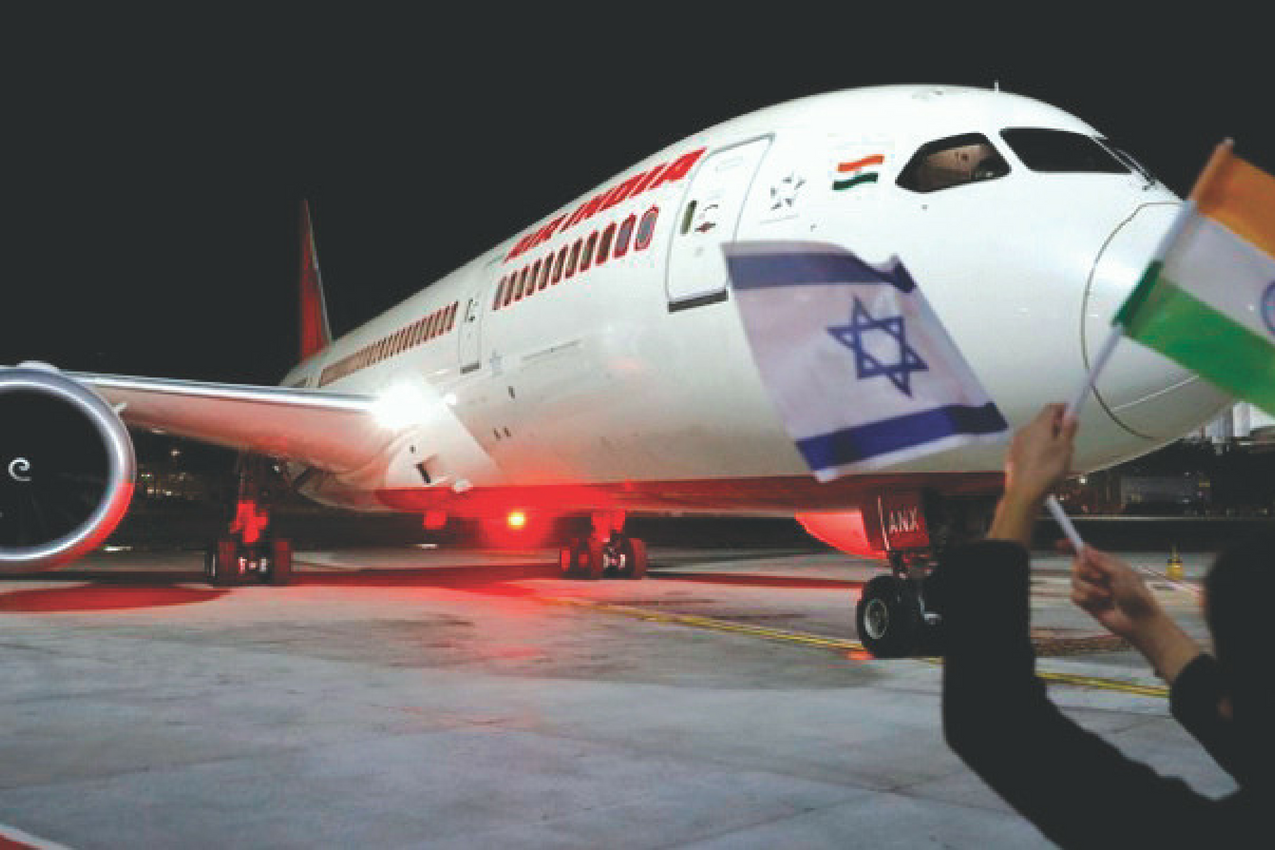This article was published in D&B’s special edition: 70th Anniversary of Israel’s Independence
Diplomatic dealings between India and Israel got a full-fledged start in 1992, under the P. V Narasimha Rao government; they realized that engaging with Israel could reap strategic, economic and diplomatic benefits for India. The very same year, Israel opened its embassy in New Delhi in February and in May India opened its embassy in Tel Aviv. Both the nations quickly made up for the time lost over decades and now agriculture and defence are the main pillars of their bilateral engagement. Ties have also expanded to areas of education and homeland security.
Indian Prime Minister in Israel
The current NDA government has been extremely active in taking relations forward with the Middle Eastern nation. In July 2017, Narendra Modi made history for being the first Indian Prime Minister to visit Israel in the past 70 years. During his visit, both the countries signed seven agreements in key areas like space, energy, agriculture, and water management. Modi expressed to Netanyahu how Israel is an important development partner for India. During his three-day trip, Modi addressed the Indian community in Israel at the Tel Aviv Convention Center. There, Modi announced that citizens of Indian origin in Israel would be supported with Overseas Citizen of India (OCI) cards, even if they had served in the Israeli military. He also invited Israeli companies to participate in the ‘Make in India’ initiative.
Modi also visited some of the hotspots of Israeli tourist destinations, including Denziger Flower Farm, Yed Vashem, Mt. Herzl, Dor Beach, grave of the founder of Zionism, and Haifa where he laid a wreath at the cemetery at the graves of Indian soldiers who had died during the First World War.
Frequency of Flights and Ease of Travel
March 23, 2018 Air India Boeing 787 landed at the Ben Gurion Airport in Tel Aviv, marking itself as the second direct flight connection between India and Israel. This was the first commercial service in nearly 70 years to use the Saudi Arabia airspace while operating flights to Israel [which Riyadh doesn’t officially recognize as a country]. The route travelled from New Delhi to Tel Aviv is believed to be a “geographical crash-course on dynamics of West Asia”.
In March this year, Israeli Prime Minister Netanyahu’s cabinet held a meeting where he declared direct flights between the two countries from Mumbai to Tel Aviv, while using Saudi Arabian airspace, to be the next goal in bilateral ties.
Air India, will now successfully be making three direct trips a week to Israel, and the new route has helped cut two hours off of the travel time.
The Israeli government supported Air India with €750,000 to be able to launch the direct connection between Mumbai and Tel Aviv. This move is being termed as a game-changer in Israel’s attempt to promote tourism from India. In 2018, India is expected to be one of the top three countries that will be attracted to Israel as a tourist destination. Israel has also upped its promotional budget for tourism to $2.5 million in the last two years. The country is also in talks of further easing up visa norms for Indian citizens. In December 2017, Tel Aviv simplified the visa application procedure, by asking for less documentation for people from the subcontinent who had completed travel to Schengen countries, USA, Canada, and Australia.
Netanyahu and Modi also perceived it to be essential that connectivity between the two nations should be enhanced through the signing of a Protocol Amending Air Transport Agreement, which will help expand cooperation in the area of civil aviation.
Increasing Footfall of Indian Tourists in Israel
Israel’s natural beauty and historical legacy—the still waters of the Dead Sea, the beautiful hills and valleys, and the centuries-old monuments and walls of Jerusalem and Nazareth, have piqued the interest of plenty worldwide, and many of them are Indians. The number of Indian travelers landing in Israel from January to October 2017 saw a rise of over 34%.
Israel has a lot to offer to travellers beyond the sacred Western Wall and Temple Mount of the Old City. There are beautiful beaches, multicolored canyons, and modern bars and wineries waiting to be explored.
According to Israel’s Tourism Ministry Director Hassan Madah, 2017 had been an important year. He established that India had been a big contributor. The country is trying to promote itself as more than just a religious pilgrimage site. In India, IMOT [Israel Ministry of Tourism] is targeting populations from metro cities who carry wanderlust. “Initially, we want to focus in the bigger cities. Gradually, we will expand our promotions to tier II and III cities,” said Madah.
Israel is in attempt to position itself as an affordable premium destination, and is targeting travellers for pilgrimages, leisure trips and meetings, conferences, and occasions like weddings.
There has been a growth of nearly 48% in the last two tears in the number of Indians visiting Israel. By October, the year 2017 already saw 49,000 Indians travelling to the nation. Within the year 2018, Israel is expecting to host one lakh Indian tourists. Tourism is an important part of the Israeli economy and contributed more than $4 billion to their GDP in 2017.
India’s love for travelling to Israel isn’t a result of only the beautiful sights; the Indian Diaspora there, the shared culture and beliefs, and a taste for hummus are additional factors that push.
Why Israelis Love Travelling to India
Himachal Pradesh, Pushkar, Kerala, Goa, and Hampi are top destinations on the list for Israelis travelling to India. After three years of compulsory service in the defence force, it is almost norm for soldiers to fly to India to ‘decompress.’ Indian government has made provisions for Israelis to get visas for six months hassle-free.
Israelis prefer India as a destination not only for the affordable travelling and meager living costs, but also because the terrain, the climate, is similar to where they come from. India offers most for the least amount of money. For Israelis travelling in groups, they are happy to find that there is something for everyone here. Some places in Himachal Pradesh are so well-adapted to receive these tourists that a lot of locals even speak Hebrew.
One need only take a look at the several blogs online and read individual travel accounts to understand the kind of peace and lightness Israelis find here, particularly in the Northern Indian hills; they cherish India’s religious openness and tolerance.
Young Israelis, millennials, enjoy Indian food, movies, and culture. Though, unsurprisingly, most Israelis knew very little about India till 1992, when the Narasimha government intervened. Some were familiar with Tagore’s writings. Many Israelis knew of Mahatma Gandhi. Few knew about the 800-year-old Indian hospice that was set up at the site where the Sufi saint, Baba Farid meditated when he visited Jerusalem in the 13th century.
Presently, more than 40,000 Israelis visit India every year. They live in small towns and off-beat villages here as long as their money can last them, and revel in the freedom India offers them.
In his third political documentary Flipping Out, the Israeli film maker Yoav Shamir covered the process of how an estimated 20,000 former Israeli soldiers, after completing compulsory service, are discharged with 15,000, shekels and use it to travel to India. One encounter in the documentary narrates the meeting between the Israeli Deputy Prime Minister Eli Ishay and former soldiers. One female soldier told him that she was on her second trip to India and that “…here one can feel normal again. No bombings, no corruption, none of that pressure [faced] back in Israel…. one comes here and feels normal again”.
Another soldier was shown hoping to not return to Israel soon; he feels more at home in India.
The Israeli–Bollywood Connection
When Benjamin Netanyahu came to India earlier this year, he marked his last evening of the visit as a star-studded one. It was a special event for the Bollywood industry called “Shalom Bollywood”. Biggies like the Bachchan family, Karan Johar, Madhur Bhandarkar, Subhash Ghai, Prashoon Joshi, Imtiaz Ali graced the occasion. Netanyahu wants Bollywood’s presence in Israel. Tel Aviv has been trying to attract investment from Bollywood for quite some time now. Netanyahu took advantage of the opportunity and showcased some of Israel’s beautiful sights as shooting hotspots. He believes that Israel and Bollywood, in partnership, could create magic.
In December 2017, Israeli tourism, foreign and culture ministries sponsored a visit for five Bollywood directors and producers to show them possible shooting locations. Potential tax breaks were even discussed for Indian productions.
Last year, Israel had its first affair ever with Bollywood; the Ministry of Tourism partnered with Dharma Productions to shoot a song in Tel Aviv and Jaffa for the movie ‘Drive’ starring Jacqueline Fernandez and Sushant Singh Rajput. In 2017, filmmakers Imtiaz Ali and Vishesh Bhatt also visited the country to explore co-production possibilities while Ali Bhatt, Ranbir Kapoor and Ayan Mukherjee visited Israel to begin preparations for another movie. The shooting trip was partially paid for by the Israeli Prime Minister’s Office and the foreign and tourism ministries.
The Israeli foreign and cultural ministries are working on a co-production agreement between Israel and India, which will connect the two countries’ filmmakers.
According to Imtiaz Ali, there is a definite possibility that Bollywood films could be shot in Israel and the security issue should not really be a concern. Places like Lake Kinneret and the Dead Sea, could look amazing on film he believes.
The connection with Bollywood, if it takes off, could work in favor of the Israeli government as an effective global media tool.”Israel offers Bollywood many opportunities with its rich history, culture, diversity and breathtaking landscape,” Daniel Carmon, Israel’s ambassador to India, had said in the invitation to the event “Shalom Bollywood”.
Mutual Interests between the Countries
According to official documents and records with the Indian Ministry of External Affairs, both countries are working on a Five Year Joint Work Plan for strategic cooperation in agriculture and water. Both sides also agreed to deepen cooperation in innovation, business and trade, space, homeland security and cyber, higher education and research, science and technology, tourism and culture. There has been implementation of Indo–Israeli cooperation in the form of a three-year work program in the agriculture sector beginning from 2018 under the guidance of the Israeli Ministry of Foreign Affairs (MASHAV) and the Ministry of Agriculture of India; this program aims at helping farmers increase productivity and optimize efficiency of water usage for them.
When the two prime ministers met, they were apprised of the progress the 28 Centers of Excellence that are being jointly established in different Indian states are making; and noted with satisfaction that seven other Centers of Excellence have become operational since Modi visited Israel. Israel will see the opening of another Indian Cultural Center in 2018 to promote greater cultural understanding between the two nations. Both countries have also signed a MoU for film co-production.
[Inputs taken from the Indian Ministry of External Affairs]










